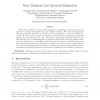Free Online Productivity Tools
i2Speak
i2Symbol
i2OCR
iTex2Img
iWeb2Print
iWeb2Shot
i2Type
iPdf2Split
iPdf2Merge
i2Bopomofo
i2Arabic
i2Style
i2Image
i2PDF
iLatex2Rtf
Sci2ools
CISS
2013
IEEE
2013
IEEE
Near minimax line spectral estimation
This paper establishes a nearly optimal algorithm for estimating the frequencies and amplitudes of a mixture of sinusoids from noisy equispaced samples. We derive our algorithm by viewing line spectral estimation as a sparse recovery problem with a continuous, infinite dictionary. We show how to compute the estimator via semidefinite programming and provide guarantees on its mean-square error rate. We derive a complementary minimax lower bound on this estimation rate, demonstrating that our approach nearly achieves the best possible estimation error. Furthermore, we establish bounds on how well our estimator localizes the frequencies in the signal, showing that the localization error tends to zero as the number of samples grows. We verify our theoretical results in an array of numerical experiments, demonstrating that the semidefinite programming approach outperforms two classical spectral estimation techniques.
| Added | 27 Apr 2014 |
| Updated | 27 Apr 2014 |
| Type | Journal |
| Year | 2013 |
| Where | CISS |
| Authors | Gongguo Tang, Badri Narayan Bhaskar, Benjamin Recht |
Comments (0)

